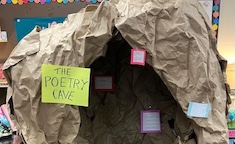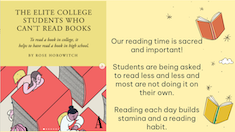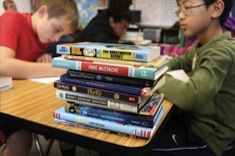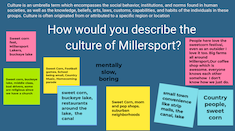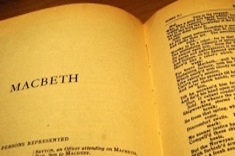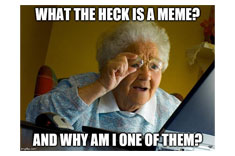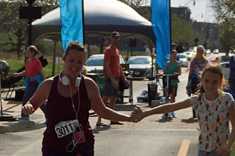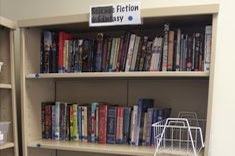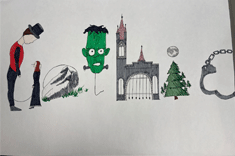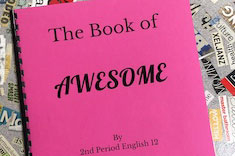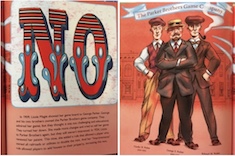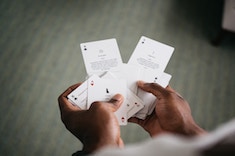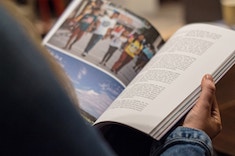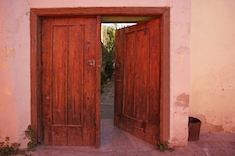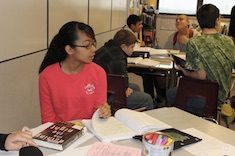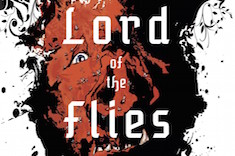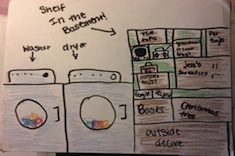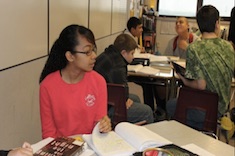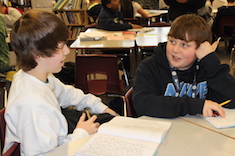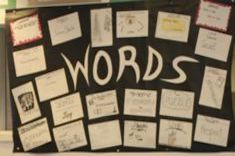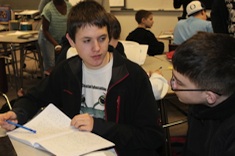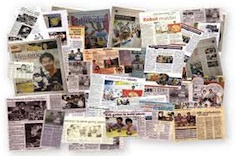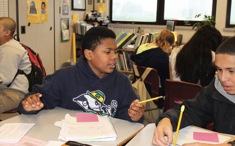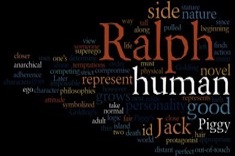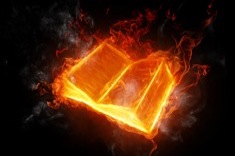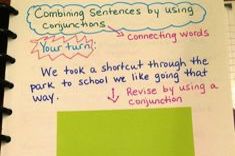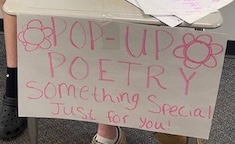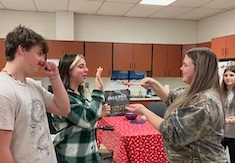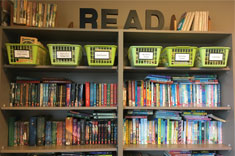Gretchen Schroeder
Gretchen Schroeder is a high school English teacher in rural Ohio, teaching everything from Advanced Placement Literature to a Poetry Workshop elective. Her passions include helping students find their voices through writing and introducing them to books they love. You can find her sharing books on Instagram @mrs_schroeders_shelves.
Latest Content
From Meet-Cutes to Happily-Ever-Afters: A Romance Genre Study
Gretchen Schroeder decided to capitalize on her high school students’ interest in romance novels and designed a genre study. Romance novels may not seem like the most obvious choice for academic rigor, but they offered a shared language to talk about love, power, identity, and relationships—conversations that matter both on and off the page.
Why High School Students Need Cardboard Castles and Poetry Caves
Gretchen Schroeder makes a case for offering creative opportunities for high school students to play with language. She names three components to ensure a creative, playful experience is successful: student choice, ownership, and inspiring invitations.
Making the Case for Reading
Gretchen Schroeder makes a case for independent reading to administrators, families, and her high school students. Gretchen offers notebook entries, scholarly articles, and whole-class activities to help everyone know the benefits of consistent, daily independent reading.
Hidden Lessons: Are We in Control of Who We Become? (Part 4)
In this final installment of the “Hidden Lessons” series, Gretchen Schroeder turns to perhaps the most complicated question of all: To what extent are we in control of who we become? It’s a question that touches on issues of identity, personal responsibility, outside influence, and human nature, all of which are especially relevant during adolescence. Gretchen includes another booklist to support this conversation.
Hidden Lessons: Why Do Relationships Matter? (Part 3)
By the time they reach high school, many students have learned how to survive change, but not always how to make sense of it. They’ve lost friendships, switched schools, experienced family transitions, or even dealt with grief. While they may not always talk openly about these experiences, they often find reflections of them in the books they read. Gretchen Schroeder continues her series about using literature to help students learn important social and relationship skills. She includes student work and a booklist.
Hidden Lessons: How Do We Cope with Challenges and Change? (Part 2)
Literature gives students a safe space to learn about struggle, resilience, and emotional growth without requiring personal vulnerability. Gretchen Schroeder offers a way to focus students’ independent reading to explore coping with challenges and change in life. You won’t want to miss the included young adult booklist. This is the second installment of a series.
Hidden Lessons: Integrating Social-Emotional Learning in an Authentic Way
We know there is a need to teach more lessons about wellness, and we know that it is sometimes difficult to teach those lessons in a way that students will accept. Gretchen Schroeder offers three questions for teachers to consider as they plan to incorporate social and emotional learning standards into their classrooms. This is the first installment of a series.
Fostering Classroom Dialogue
Gretchen Schroeder shares her big takeaways from reading Inspiring Dialogue. Now more than ever, we need to help students express themselves and claim their voices, because the classroom is one of the last places where we can engage in dialogue about big questions with those who might not share our beliefs.
Zooming In and Stepping Back
Gretchen Schroeder creatively leads her students in chronicling key scenes from a novel so they can evaluate which ones are important and use it as a reference throughout their discussions.
I Was Wrong About…
Gretchen Schroeder invited her students to write personal essays inspired by the 2022 New York Times series “I Was Wrong About.” Gretchen shared with her students (and now shares with us) the way she was wrong about her mammy collection.
Love Poetry: Take It or Leave It, but Tell Me Why
In today’s world we are bombarded with opinions that are increasingly polarizing, and this is especially true for teens and their opinions of love poems. Gretchen Schroeder uses love poems to help students learn how to back up an opinion with criteria, details, and examples.
Literary Salons: Book Clubs, Elevated
Inspired by the 17th-century popularity of literary salons, Gretchen Schroeder changed the usual book club routine for her high school students. Literary salons allow people to explore big topics and ideas together without reading the same book. They can create engaging discussions, expose students to new ideas and books, and give them the chance to learn from one another in a relaxed way.
Putting Political Talk into Perspective
Gretchen Schroeder encourages teachers to help students know how to talk politics by establishing a positive mindset and attitude when approaching conversations.
Examining Power Dynamics
Gretchen Schroeder leads her students to consider the power and privilege in the texts they read. By creating a power continuum, students become more aware of issues of power and oppression in society. Once this happens, they can move to discussions of how to take action for positive social change.
Ways to Celebrate National Poetry Month
Gretchen Schroeder incorporates poetry into her high school classroom as much as possible, and in April she makes a plan to go big! Gretchen shares a variety of ways to create memorable and fun experiences around poetry no matter your grade level.
Using Drama Games to Approach Difficult Conversations
Gretchen Schroeder is committed to having conversations about race and racism with her high school students. Sometimes it’s difficult to engage students, so Gretchen used drama games as a means to think about concepts metaphorically, then ground them within the text, and, finally, have students apply them to their own lives and the world.
Kintsugi
Given an assignment to break a china bowl and rebuild it allowed Gretchen Schroeder to engage in the Japanese art of kintsugi. What surprised her were the lessons she learned about growth and innovation in her teaching practice.
Poetry Strategies for Partners and Groups
Gretchen Schroeder offers three ideas for partners or small groups to engage with poetry. Not only will they get creativity flowing, but they will also lift writers’ energy.
Detours: A Reminder of the Humanity of Students
Gretchen Schroeder reminds us of the importance of checking in with students and gauging how they are feeling—and then responding with authenticity and joy.
Considerations for AI in the Classroom
Gretchen Schroeder considers the positive ways AI will influence her high school English classroom.
Does Gender Impact Reader Engagement?
Gretchen Schroeder questions whether the protagonist’s gender influences her students’ engagement with a text. Using the dystopian novel Legend, which has two protagonists of different genders, Gretchen gathered feedback from her students. What she discovered was that a reader’s engagement with a text has more to do with empathy than with gender. You’ll love Gretchen’s new way of selecting whole-class texts for her students.
Considering Positionality and Developing New Sight Lines
Gretchen Schroeder shares a powerful approach to reading response to help students consider their positionality in a scene. Your identity, your thoughts, and your experiences influence the way that you relate to a text. This is your positionality as a reader, and it’s important to consider your positionality within a text because it explains how and why we come to certain conclusions as we read.
How Long Does This Have to Be?
Students often question how long a piece of writing needs to be. Gretchen Schroeder shares a strategy that changed the focus of writing projects from length to meaning.
Three Ways to Engage Your Students in Reading and Writing Poetry This Spring
Gretchen Schroeder offers three poetry-writing activities to take the pressure off the writing process by using another poet’s structure and/or words as a starting point. You’ll be amazed by how deep and personal the resulting poems can become. Download a PDF for students to collect lines for a cento poem.
It’s the Final Countdown: Using Chunking and Timers to Scaffold Reluctant Writers
What do you do when students won’t write during class? Gretchen Schroeder offers a creative, practical, and effective solution.
Rural Matters: Revealing Perceptions and Celebrating Roots
Gretchen Schroeder addresses the negative and positive perceptions of rural people with her high school students through readings, discussions, and analytical writing. Download a guide for Critical Rural Perspective Analysis to use with your students.
Less Is More: Using Novels in Verse in the Classroom
Gretchen Schroeder explains the reason why she believes requiring high school students to read novels in verse during independent reading time is worthwhile for their reading identity and developing more sophisticated understandings of literary analysis.
Spoiler Alert: You Can Start Big to Go Small (Macbeth in One Class Period)
Gretchen Schroeder confesses her fast-paced approach to sharing Macbeth with her high school students. Starting with the big picture of the story and then drilling down into specific scenes for skill practice not only accomplished the goals for the unit, but also freed up more time and space for other curriculum needs.
Renewing Energy in the Classroom
Gretchen Schroeder finds ways to increase students’ energy for doing work in her classroom. Her practical tips are useful for all students.
Making Time for Poetry
Gretchen Schroeder encourages teachers to make time for the things that are important. For her, it was poetry, and she outlines how she created a weekly poetry ritual in her high school classroom that enhanced the curriculum.
Making Queer Inclusivity Less Complicated
Gretchen Schroeder intentionally uses tried-and-true instructional practices to increase the inclusivity of texts and topics in her high school English class.
Using Daily Attendance Questions to Build Community and Communication Skills
Gretchen Schroeder is surprised to find benefits of a stronger community and communication skills through a practical attendance routine in her high school classroom.
Branching Out: Allowing New Influences on Our Pedagogy
In this second part of a series on educational theorists, Gretchen Schroeder shares the way she has branched out to evolve and adapt to serve all students in an equitable way. Her reflection inspires all of us to branch out to make space for new ideas.
Reflecting on My Roots
In this first of a two-part series, Gretchen Schroeder reflects on three educational philosophers who ground many practices, and pushes us to not stay stuck in the past. We must adapt these practices and honor new voices in the field that will keep us moving forward.
What Do You Meme: Logical Fallacies
Gretchen Schroeder teaches her high school students how to notice and combat logical fallacies, a much needed skill due to the fact that most of her students use memes as their primary news source.
The Reluctant Marathoner: Reflecting on Student Engagement
Gretchen Schroeder uses her reluctance as a marathon runner to reflect on how to encourage more engagement in reading and writing.
Leading Students Toward Underused Sections of the Classroom Library
Gretchen Schroeder intentionally leads students to “jilted genres” in her classroom library.
Reading Quiz
Gretchen Schroeder shares the way she adjusts her reading quizzes to assess students’ analysis and deep thinking about texts.
Learning to Notice and Analyze Complexities
Gretchen Schroeder supports her high school students to think deeply about the complexities around them, beginning with themselves and pop culture, and then moving to the texts they are reading.
September 10: How do you make workshop work?
Making workshop work is the theme of this week’s newsletter.
Three Meaningful Ways to Incorporate Drawing into English Class
Gretchen Schroeder shares three meaningful ways to incorporate drawing into her high school English classes, and the purpose behind each strategy.
Rethinking Late-Work Policies
Gretchen Schroeder asks herself tough questions about her late-work policy for high school students. In the end, she changed her late-work policy and found that it took no effort on her part, other than a shift in mindset, while yielding powerful results.
Is Grammar-Check Cheating?
Gretchen Schroeder discusses grammar tools and the reasons students should use them as writers.
Crafting Argumentative Essays
Gretchen Schroeder shares a summative assessment inspired by Song Exploder in which her high school students craft an argumentative essay defending a choice of a great song.
Finding the Purpose in Antiracist Literature Instruction
Gretchen Schroeder shares her failures in preparing for antiracist literature instruction, and the principles she uses to empower meaningful conversations about race.
Making Connections with Sociograms
Gretchen Schroeder taps into the connections between characters by creating sociograms with her high school students.
Online Writing Notebooks
Gretchen Schroeder makes the leap to digital notebooks and finds new life in a tried-and-true practice.
Recognizing Bias Podcast with Gretchen Schroeder
Gretchen Schroeder discusses recognizing bias on the podcast.
Laying the Foundation for an Equitable Classroom
Gretchen Schroeder shares the building blocks she uses to define equity for herself and her students, as well as a practical way to put them into action in her rural high school classroom.
A Student Book of Awesome
Gretchen Schroeder’s high school students build community by creating a shared text of things they love.
Using Picture Books for Rhetorical Analysis
Gretchen Schroeder finds that picture books are the perfect tool for rhetorical analysis with her high school students.
Fostering Cultural Awareness Through Book Clubs
Gretchen Schroeder’s students are almost all white and live in a rural community. She finds book clubs are a wonderful tool for expanding cultural awareness.
Flipping Literature Discussions
Gretchen Schroeder realizes her experiences from decades ago as a student are clouding her perspective on “flipped” literature discussions. Once she gets over her biases, she finds that online discussion of literature is a powerful equalizer for student voices.
Picture Books for Persona Poems
Gretchen Schroeder uses picture books to help her high school students understand and write persona poems.
Dealing with Lists in Style
Polysyndeton, asyndeton—if you are a writer and a word nerd, you will love Gretchen Schroeder’s suggestions for helping your students create lists with style in their writing.
Appointment Clocks
Gretchen Schroeder uses “appointment clocks” to ensure her students meet with a variety of peers for partner work.
Key Elements of Short Stories
Gretchen Schroeder finds her students’ enthusiasm for writing short stories flags quickly without some instruction and guidance.
Writer’s Notebook Tweaks
Gretchen Schroeder analyzes the use of writing notebooks in her classroom, focusing on what’s confusing or frustrating for students. She makes some small changes that yield big results.
Poetry Path
Gretchen Schroeder outlines a way to involve the entire school community in engaging in poetry.
Reading Bingo
Gretchen Schroeder has developed a fun version of Reading Bingo to help students explore their identity as readers. The activity includes clever social media inspired options like creating memes and “bookstagram” posts.
The Power of Similes
If you want stronger poetry from students, a good starting point might be to explore how to write a powerful simile. Gretchen Schroeder explains how she helps her high school students play with and create better similes.
The Third (or More) Time Is the Charm
Gretchen Schroeder finds helping her students see the value in rereading poems is all about helping them pay close attention to imagery.
Hunting for Textual Evidence
Gretchen Schroeder finds just telling her high school class to include textual evidence when making points and arming them with sticky notes leaves many students bewildered. She regroups and comes up with activities to scaffold their understanding of what makes for valid evidence.
Teaching Tone: Deal Me In
Gretchen Schroeder’s high school students are surprised to see a deck of cards on their supply list. The cards are a tool for teaching the vocabulary of tone in creative ways.
Fear of Reading
Gretchen Schroeder reflects on why some of her students have developed a fear of reading by the time they reach high school.
When One Door Closes
Gretchen Schroeder finds new routines in her high school workshop means letting go of old expectations.
Flipping Negative Teacher Emotions
Gretchen Schroeder struggles to understand the meaning and value of her teaching when two former students overdose and die, another pleads guilty to murder, and yet another is arrested for domestic violence. She also looks at the corrosive effects of both apathy and envy. The result is a deep reflection on how teachers can move beyond sadness and other difficult emotions.
Spoken Word Poetry
Gretchen Schroeder uses online videos as resources to teach her high school students to appreciate spoken-word poetry and write their own.
Choose Your Own Grammar Adventure
Gretchen Schroeder shares a quick exercise she’s developed for her high school students to hone grammar and editing skills using online video resources and individual Chromebooks.
Using Podcasts as an Alternative to Article of the Week
Gretchen Schroeder adapts the popular "Article of the Week" activity with podcasts as an alternative in her high school classroom, and shares some of her favorite podcasts to use with students.
Focused Revision: Introductions
Gretchen Schroeder focuses solely on revision to introductions in her high school classroom with three fun activities to teach students new possibilities for beginnings.
Writing Effective Conclusions
Anadiplosis, tricolon, syntax and such — when Gretchen Schroeder's high school students are stuck in rhetorical ruts, she teaches them some new rhetorical tricks for crafting conclusions.
Quick Vocabulary Practice and Assessment
Gretchen Schroeder finds that any vocabulary routine eventually gets stale in her high school classroom. She shares a couple of favorite options for reinvigorating word learning.
When a Book Doesn’t Work
Gretchen Schroeder is frustrated when a novel that has worked well for many years doesn’t appeal to her current high school students. Letting go of it is hard.
Humor Writing with Teens
Gretchen Schroeder develops a unit on humor writing that engages and delights her high school students.
My Five Objectives for the Start of the School Year
Gretchen Schroeder winnows many competing demands at the start of the year down to five clear objectives in her high school classroom.
Small Solutions for Big Problems with Classroom Discussions
Gretchen Schroeder shares some conversation fixes for when talk goes awry in her high school classroom.
Visual Essays
Gretchen Schroeder finds visual essays are a fun option for her high school students to present what they have learned just before Christmas break.
Random Poetry
Gretchen Schroeder finds creative ways to pique interest in poetry in her high school classroom.
Tweets in the High School Classroom
Gretchen Schroeder finds that tweets are a terrific quick assessment tool for analyzing student understanding of everything from nonfiction texts to character development in classic literature.
Amazing Race
Gretchen Schroeder uses the format of the Amazing Race television show to help her high school students master materials for final exams and get moving throughout the school for a fun break.
The Case for the Sonnet
Gretchen Schroeder makes a case for teaching the sonnet to teenagers in the age of texts and Twitter.
Vocabulary Instruction: Where to Start?
Gretchen Schroeder looks for new ways to help high school students learn words.
Slow Down
Gretchen Schroeder has three strategies for slowing down with her high school students and savoring literacy learning.
Time for What Matters
Gretchen Schroeder has only 42 minutes with her high school students each day. She explains how she establishes priorities.
Extended Inquiry with Article of the Week
Gretchen Schroeder finds the article of the week activity is an excellent vehicle for learning about content literacy gaps in student background knowledge and how to fill them.
Mentor Texts and Memoir Writing
Gretchen Schroeder finds one mentor text has many uses as her high school students explore memoir writing.
Reading Pictures in High School
Gretchen Schroeder melds famous artwork with literacy instruction in her high school classroom.
“Are We Gonna Watch the Movie?”
Gretchen Schroeder finds her high school students are always eager to see the movies related to the novels they are reading in class. Yet it rarely makes sense to show the entire film. She explains how to choose clips judiciously.
Guess Who’s Coming to Dinner?
Gretchen Schroeder finds the classic dinner party assignment is a fun way for her high school students to explore kindred spirits in literature late in the school year.
Group Composing
Gretchen Schroeder finds group composing is a fun way to build community, writing skills, and understanding of how arguments work with her high school students.
Using Lord of the Flies to Teach Argument
Gretchen Schroeder has suggestions for using short texts and close reading to help students comprehend The Lord of the Flies.
How to Get a Book to Catch Fire
If your goal is to get teens more excited about independent reading, Gretchen Schroeder has suggestions to help.
Rethinking Grammar Instruction in High School
What conventions can be taught in a way that sticks with older adolescents? Gretchen Schroeder slows down and focuses to improve her instruction.
Candy Memoirs
Gretchen Schroeder ditches the long discussion of rules and procedures with her high school students, and instead gives writing workshop a sweet start.
Act III: Exploring Subtext with A Midsummer Night’s Dream (Shakespeare and the Common Core Series)
Gretchen Schroeder concludes her Shakespeare in the Age of the Common Core Series with activities to explore subtext in A Midsummer Night’s Dream.
Act II: Understanding Hamlet Through Close Reading (Shakespeare and the Common Core Series)
Gretchen Schroeder continues her Shakespeare and the Common Core series on teaching the classics in high school, explaining how she uses Hamlet in creative ways to teach close reading strategies.
Act I: Delving into Deep Questions with Macbeth (Shakespeare and the Common Core Series)
Gretchen Schroeder launches a three-part series on Shakespeare in the Age of the Common Core. This week’s installment is a fresh take on teaching Macbeth to high school students.
Your Opinion Matters—Really
Gretchen Schroeder guides us in getting feedback from students, as well as sharing with students the way their feedback matters to us. In a world where we are constantly asked to fill out feedback forms, it’s good to know when our opinions matter.
The Cure for Senioritis? Poetry!
There may be a group of students somewhere less eager to learn than a class of high school seniors during the last weeks of school, but that group would be as tough to find as Bigfoot or the Loch Ness monster. Gretchen Schroeder discovers a surprising cure for senioritis —modern poetry.
Madness, the Spring Slump, and High School Readers
Are your adolescent readers present in body but not necessarily in spirit by springtime? We've featured the "book madness" bracket activity in the past for elementary students. Gretchen Schroeder finds the ranking, competition, and passionate discussion about favorite books is just what her high school students need to get their heads back in the reading game.
Panels and Pages: Using Graphic Novels in the High School Classroom
Gretchen Schroeder bolsters her students’ reading lives and deepens discussion about theme by using the rich graphic novel They Called Us Enemy as a whole-class read with her high school students. Gretchen shows how teachers can support students in deep literary analysis.
Pop-Up Poetry
Inspired by real-life pop-up poets, Gretchen Schroeder designed a similar experience for her high school students. Gretchen outlines the process for preparing and implementing a pop-up poetry event in the halls of your own school. This activity is focused on poetry, but Gretchen thinks it ended up being about squashing your inner critic, trusting your instincts, and leaning into personal connections.
Building Community Around Food and Poetry
Gretchen Schroeder creates strong connections with her high school students as they come together as writers around the shared need for and love of food.
The Hermit Crab Essay: Finding a Shell to Share a Vulnerable Story
Gretchen Schroeder introduced the hermit crab essay as a creative nonfiction genre to her high school students. What began as an intriguing writing invitation led to realizing that students want to process these events through writing and that the hermit crab essay gives them a way to do so that is less daunting than just a blank page.
Setting the Room for Collaboration
Gretchen Schroeder offers advice on how to arrange a high school classroom for collaboration.
Moving from Whole-Class Texts to Independent Reading: Characterization
Gretchen Schroeder offers a starting point to help her high school students prepare to write an in-depth character analysis essay.
Shake It Up: Active Learning Strategies That Engage Students
When Gretchen Schroeder found herself wanting to make her lessons fun and enjoyable, she realized she was focused on trying to entertain and dazzle rather than facilitate learning. She offers three ways to help students be active learners through conversations, reflection, and collaboration.
Browse Content By
Type
Category
- Assessment Tools
- Big Fresh Archives
- Booklists
- Choice Numeracy
- Classroom Design
- Common Core
- Community Building
- Conferring
- Content Literacy
- Digital Literacy
- English Language Learners
- Equity
- Family Relations
- Free Samples
- Guiding Groups
- Leadership
- Literacy Coaches
- Mentor Texts
- Minilessons
- New Teacher Mentors
- Podcasts
- Poetry
- Quote Collections
- Reading Strategies
- Self Care
- Struggling and Striving Learners
- Talking and Listening
- Teacher Study Groups
- Teaching Reading
- Teaching Writing
- Word Study and Vocabulary
Author
- Melissa Quimby
- Nawal Qarooni
- Gwen Blumberg
- Julie Cox
- The Lead Learners
- Hannah Tills
- Josie Stewart
- Ruth Metcalfe
- Mallory Messenger
- Becca Burk
- Jodie Bailey
- Vivian Chen
- Mary Brower
- Tiffany Abbott Fuller
- Stephanie Affinito
- Ruth Ayres
- Leigh Anne Eck
- Heather Fisher
- Shari Frost
- Julie Johnson
- Suzy Kaback
- Gigi McAllister
- Shirl McPhillips
- Melanie Meehan
- Cathy Mere
- Debbie Miller
- Tara Barnett and Kate Mills
- Tammy Mulligan
- Dana Murphy
- Bitsy Parks
- David Pittman
- Brenda Power
- Heather Rader
- Matt Renwick
- Mandy Robek
- Christy Rush-Levine
- Gretchen Schroeder
- Jen Schwanke
- Brian Sepe
- Katherine Sokolowski
- Stella Villalba
- Jennifer Vincent
Grade Level
Choice Literacy Membership
Articles
Get full access to all Choice Literacy article content
Videos
Get full access to all Choice Literacy video content
Courses
Access Choice Literacy course curriculum and training


